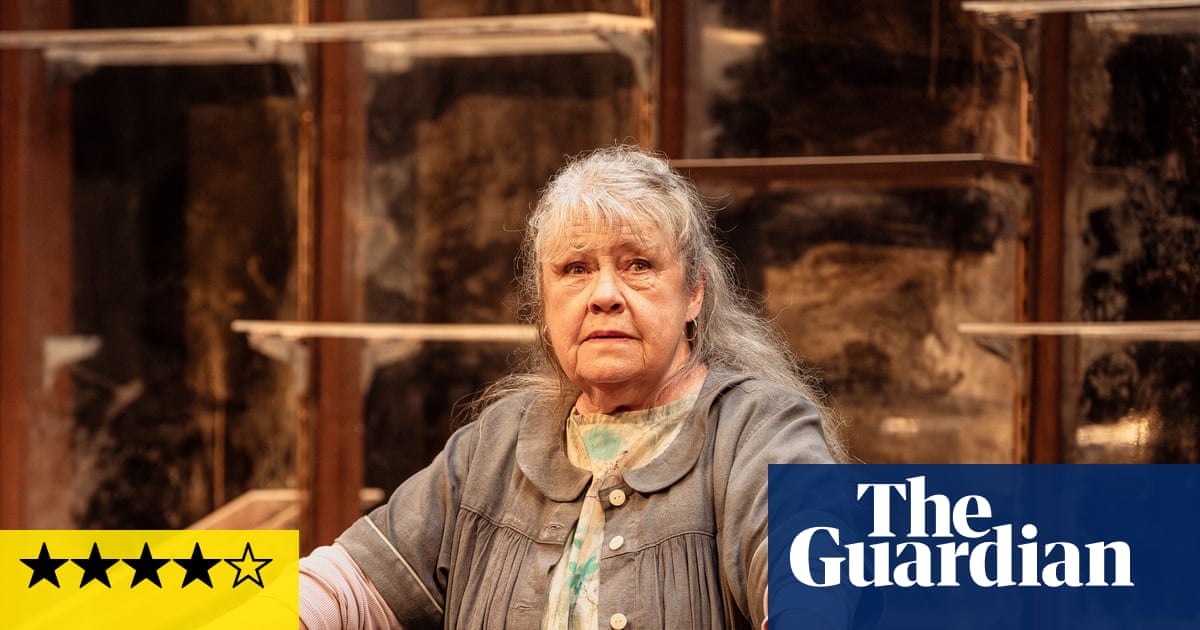Wood-panelled bar. Mirror splashback. Threadbare carpet. This could be The Standard, The Fox or The Tote but it isn’t – it’s The Lark. This “brick and bluestone box” has seen better days. There isn’t a patron in sight – merely the septuagenarian publican, the aptly named Rose Grey, shuffling around on a walking stick – and the building is soon to be demolished. Last drinks have, definitively, been called. You can almost smell the stale beer and piss, the reek of long-ago drinking sessions and unsatisfied yearnings.
The pub – a “third place”, in the words of sociologist Ray Oldenburg, existing between home and work and offering belonging and respite – is a fitting setting for The Lark, Daniel Keene’s elegiac monodrama about memory, loss and regret. It follows last year’s powerful and moving revival of Mother, Keene’s 2015 play about an unhoused woman named Christie, and reprises the same creative team, namely director Matt Scholten and actor Noni Hazlehurst (for whom both parts were written). Both evince Keene’s predilection for the melancholic and existentialist and are shot through with his recognisable blend of lyricism and old-fashioned ockerisms.
Whereas Mother’s Christie was rageful, her misfortune having twisted into something akin to neurosis, Rose is resigned and wistful although still, like Christie, rough as guts. As played by Hazlehurst – wonderful in the part, by turns salty and lachrymose – Rose’s signature mannerism is the bilabial blow, the rapid blowing of air between the lips signifying derision or, more often, dismissal. Thus Rose dispels, or rather attempts to dispel, the myriad ghosts who haunt The Lark – including her father, George, a war veteran who acquired the pub under “dodgy” circumstances and ultimately bequeathed it to his daughter.
Rose’s mother, Irene, left shortly after she was born, and Rose tells us she never had much luck with men (“I’ve had the men I’ve had,” she shrugs). Instead, her recollections revolve around her father, a man with fine hair and a reedy voice “shut up tight as an oyster”. Rose recounts, devastatingly, George’s succumbing to dementia, the loss of the other pea in her pod to the condition’s mercurial sadnesses, paranoias and dislocations of self. “We scratched a living,” Rose says of their halcyon days, “and forgot about the past.”
But The Lark is, fundamentally, a play about the impossibility of forgetting. (Keene quotes William Faulkner in his program note: “The past is never dead. It’s not even past.”) We sense that Rose has told these stories many times before – about having been born in the pub, about her attempt to leave home and work as a cook on a boat, about closing time and the colourful cast of regulars whose immoderate boozing enabled the Greys to “hang on grimly to the tits of life” – and will, despite protestations to the contrary, do so many times more.
We also sense, unsettlingly, that these characters – the glamorous Dolly, Jenny Candles and her rosary beads, a nameless, unremembered woman on her own playing solitaire – might be emanations from Rose’s own dementing mind. Her nostalgic yet increasingly fraught recollections of the early evening light streaming through the coloured glass of the pub’s doors could be a sign of sundowning, a symptom of dementia that occurs as daylight fades. She is like a spirit doomed to play out the past on a perpetual loop and, indeed, recalls a patron – a buttoned-up Christian with a Bible under one arm – who once dubbed The Lark “purgatory”. (The souls in here, Rose quips, would need a long time to cleanse themselves of their sins.)
The Lark, in its premiere season, is a production as immaculately well-crafted as Keene’s script. Scholten’s direction is commendably unobtrusive while Darius Kedros’ sound design evocatively combines ripples of haunted piano with washes of ambient electronics and distant traffic noise (ask not for whom the Melbourne tram bell tolls). Richard Vabre’s warm, yellowy lighting, subtly rising and falling in concert with the rhythms of Rose’s yarning, superbly complements Emily Barrie’s dilapidated L-shaped bar.
Despite its occasional lapses into cliche, The Lark is every bit as good as its predecessor. It is, in its way, a portrait of a disappearing Australia, one in which the pub played a central role in its social life. This “church of the godless” and “Noah’s ark for the lonely”, as Rose puts it, is already in the process of being forgotten – if it was ever known – by generations who barely drink. But I’m reminded that the magpie lark, after which Rose’s pub is named, is one of only a few species of bird that sings in duet. They, like us, are better off with company.
